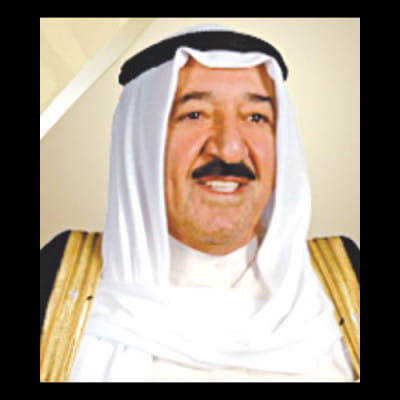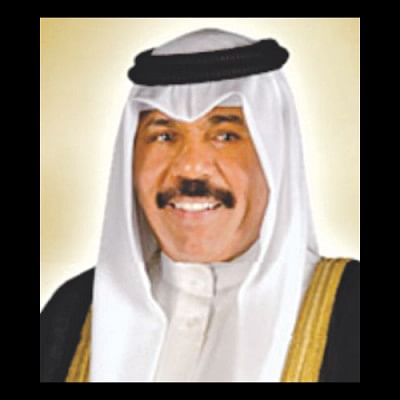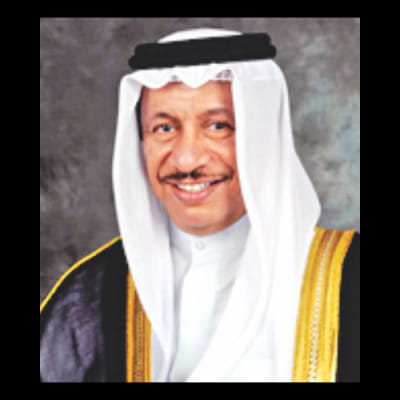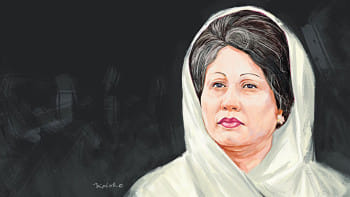FOREIGN POLICY OF THE STATE OF KUWAIT

The cardinal principle on which the foreign policy of Kuwait is based had been enunciated by the late Amir of the State of Kuwait Sheikh Jaber Al-Ahmad Al-Jaber Al-Sabah, the Amir of the State of Kuwait when he declared that, “Kuwait lives under the protection of Islam as its religion, Arabism as its homeland, cooperation as its strategic path, tolerance as its motto, fraternity as its guidance, constitution as its modus operandi, justice as its rule, progress as its responsibility and peace as its goal”.The objective of Kuwait's pursuit of diplomacy is based on a pragmatic and balanced approach and is conducted in accordance with the government's philosophy and the interest of the State. Kuwait adheres to a policy, which is characterised by clarity, straightforward and quiet diplomacy. It strives to strengthen cooperation with all countries on the basis of mutual respect and non-intervention in the internal affairs of other States. It advocates the use of peaceful means in resolving all problems between States in accordance with the principles of right and justice, away from conflicts, sphere of influence and International blocs. His Highness the amir, Sheikh Sabah Al-Ahmad Al-Jaber Al-Sabah, while outlining the salient features of Kuwait's foreign policy, said that 'one of the main objectives of Kuwait's diplomacy is to cooperate with all countries to maintain world security and stability as well as reach sustainable development of societies.
Kuwait endeavors to promote peace among nations and enter into partnerships with brotherly and friendly countries for the development of societies. At the same time, Kuwait's policy is concerned with the safeguard of her independence and sovereignty and her freedom of political decision. His Highness the amir, Sheikh Sabah Al-Ahmad Al-Jaber Al-Sabah asserted that the pursuit of Kuwait's diplomacy is the first line of defence of the State's security and interests. This policy stems from her belief in a common Arab destiny towards the development of relations with its fraternal Arab States. Hence, Kuwait plays a significant role in the progress of the Arab League and its bodies and gives her wholehearted support to the Palestinian cause, which is at the core of Arab cause.
Kuwait is an ardent advocate of Pan Arabism and its policy and interest in the Arab world is motivated by its strong adherence to the principles of Arab nationalism. Indeed, for Kuwait, Arab solidarity is not an outfit to be put on and off to suit its interest. It is blood in the veins, a candle in the heart, heritage passed by forefathers, ambitions and security, language and religion, history and geography, air and water, an undiluted and a never ending inter-twine interest. Kuwait always has a throbbing heart for the concerns of the Arab nation. Its hands are always extended towards them. It is an active and vocal member of the Arab League and plays a leading role in promoting economic prosperity in the region through Kuwait Fund for Arab Economic Development. Through Kuwait Fund, Kuwait launched economic cooperation with all the countries as well as attract foreign investments in Kuwait. In its pursuit of economic diplomacy, His Highness the Amir said that the loans and grants provided by Kuwait Fund as well as the Kuwaiti donations for other International funds are a testimony of Kuwait's effective role in building bridges of friendship and cooperation by financing development projects in the four corners of the globe. Kuwait is vocal in its demand for withdrawal of Israeli occupation forces from all Arab lands illegally and forcibly occupied by Israel.
Kuwait has been a firm supporter of the Middle East peace process since the Oslo accords. At the 1994 donors' conference, Kuwait was one of only three Arab states to contribute to the Palestinian Authority, committing itself to $25 million dollars in development aid to the Palestinian people, in addition to the millions of dollars sent by Kuwait-led multilateral funds for projects in the West Bank and Gaza. Kuwait again contributed to Palestinian development at the second donors' conference, held in Washington in 1998. Kuwait has declared its support for the Oslo process, has participated in all multilateral meetings related to the peace process, and has lifted the tertiary and secondary boycotts on trade with Israel. In response to the United Nations appeal for humanitarian assistance for Syrian war victims, Kuwait twice hosted a donor countries summit meeting, the first in January 2013 and the second in January 2014. Recently, Kuwait hosted a meeting of over 70 countries in Kuwait this February, to raise fund for the reconstruction of Iraq.

Kuwait emerged as the leader of humanitarian aid providers with a generous contribution of US $ 800 million so far towards the planned US $ 5 billion fund.
Being a Gulf State, Kuwait played a pivotal role in bringing about the unification of the Gulf Emirates. The formation of the Gulf Cooperation Council (GCC), a brainchild of His Highness the Amir of Kuwait, was perhaps one of the most important landmark of Kuwait's foreign policy. The idea of floating such a regional forum emanates from a common perception and outlook on regional and other matters by the Gulf States. His Highness the Amir of Kuwait conceived such a forum to promote cooperation and co-ordination amongst the member States in all spheres not only for their mutual benefit but also for the whole Arab nation. His Highness the Amir stated that Kuwait attaches importance to the unity among the Gulf Cooperation Council members to meet the challeges of rapid developments in the region. Kuwait was the host of the 34th summit of the Gulf Cooperation Council in December 2013 which focused on the unified political stance of the member States on matters of regional and international concerns. The conference also laid emphasis on striving to attain economic integration.
On the Islamic level, Kuwait ardently believes that the progress of the Islamic Ummah is linked with the cooperation and co-existence of the Muslims in a spirit of tolerance and fraternity. Since the dawn of Kuwait's independence, this country exerted strenuous efforts, particularly under the sagacious guidance of His Highness Sheikh Sabah Al-Ahmad Al-Jaber Al-Sabah Al-Sabah, the architect of Kuwait's foreign policy and the Amir of the State of Kuwait, and the prudent leadership of His Highness the Crown Prince and His Highness the Prime Minister, to fulfil Kuwait's strong commitment to the welfare and progress of the Islamic Ummah. This was aptly reflected when it hosted the 5th OIC Summit meeting in January 1987.
On the International plane, Kuwait's foreign relations have always been balanced and based on openness. It is worth mentioning here that Kuwait was the first Gulf country to have recognised and established diplomatic relations with the erstwhile Soviet Union, in the cold war era. The recent hosting of the Asian Cooperation Dialog Summit by Kuwait testifies Kuwait's eagerness to buttress cooperation among the Asian countries.
Kuwait is known as an ardent supporter of peace and stability and therefore it has always mediated for peace whenever the opportunity arose. In 1974, Kuwait mediated to include Bangladesh in the first OIC Summit Meeting in Pakistan. More recently, Kuwait played a mediating role in the standoff between neighbouring Gulf countries.

As part of Kuwait's role in pursuing a dynamic and pro-active foreign policy, Kuwait hosted the third Arab-African Summit in November 2013. His Highness the Amir Sheikh Sabah Al-Ahmad Al-Jaber Al-Sabah announced a loan of US $ 1 billion to African countries over a five year period in addition to another US $ 1 billion worth of investments in the infrastructural development projects.
As an active member of the Arab League, Kuwait will play host to the 25th Arab League Summit in March this year which will focus on Arab integration, cooperation and coordination as well as the latest Arab developments.
This candid approach in the conduct of its relations with other countries, based on cooperation, understanding and continuity, is not a mere coincidence or a passing phase that might be altered with a change of faces in the government. Rather, it is a philosophy felt deeply by the government and is based on self-confidence and mutual trust between the citizens and the government of Kuwait.
Kuwait aspires to a new approach in International Relations moulded by a New World Order, which is based on international legitimacy and a rejection of the principles of using force, terrorism and aggression to alter the status quo.
It is an ardent believer in promoting international place, security and stability. On this note, Kuwait hosted a number of international and regional summits including the GCC summit, the OIC summit, Arab Economic and Social summit and Asian Cooperation Dialog summit.
Further, His Highness Sheikh Sabah Al-Ahmad Al-Jaber Al-Sabah, Amir of the State of Kuwait, the architect of Kuwait's foreign policy makes regular visits to different countries to promote international peace and security.
Kuwait is currently in the midst of a transformation, as it considers its place in the era of globalization. The Kuwaiti people recognize the nexus between domestic and foreign policy, and have undertaken tremendous political and economic decisions that prepare the country for sweeping reforms. In recent years, Kuwait has deepened its commitment to democratic progress. It has expanded the voting franchise; embarked upon an ambitious plan to privatize the state-centered economy; and opened up the country to direct foreign investment. Kuwait is negotiating with foreign companies to invest in the upstream oil sector; and has closed the loopholes in laws protecting intellectual property rights. All these steps are aimed at maintaining Kuwait's political and economic viability throughout the new millennium.
Kuwait strongly advocates the continued role of the United Nations in ensuring international peace and security. Kuwait calls for international cooperation to protect humanity, individuals and groups from the dangers of ethnic, racial and State terrorism and all forms of concomitant threats and blackmails.
At the World Bank, the International Monetary Fund (IMF), and other multilateral agencies, Kuwait is a major donor. Historically it has contributed 5 per cent of its GDP to economic development of other countries; this places Kuwait near the head of the list of donor countries as a percentage of GDP.
Kuwait's strong adherence to what it regards as the basic principles of her external policy has been put to severe tests on a number of occasions.
Kuwait does not compromise its principles and honour. His Highness the Amir had once said in October 1985 that 'our decision will remain free and we will not yield to blackmail, terrorism and emotionalism".
Kuwait has strong conviction that World peace in general and regional peace, stability and prosperity can only come through a rational approach to divisive issues which could be and should be resolve amicably through discussions.
In this aspect, it has tremendous faith on the United Nations and its principles and charters, as a means of sustaining international legitimacy, peace and security of all the countries.
Therefore, it is no mere co-incidence that Kuwait shares the belief of all peace loving countries that adherence to the UN charter and respect for the principles and objectives of the United Nations Security Council will usher in a new era of peaceful cooperation and co-existence, stability and security and progress and emancipation in the Arab Gulf Region.

 For all latest news, follow The Daily Star's Google News channel.
For all latest news, follow The Daily Star's Google News channel. 



Comments